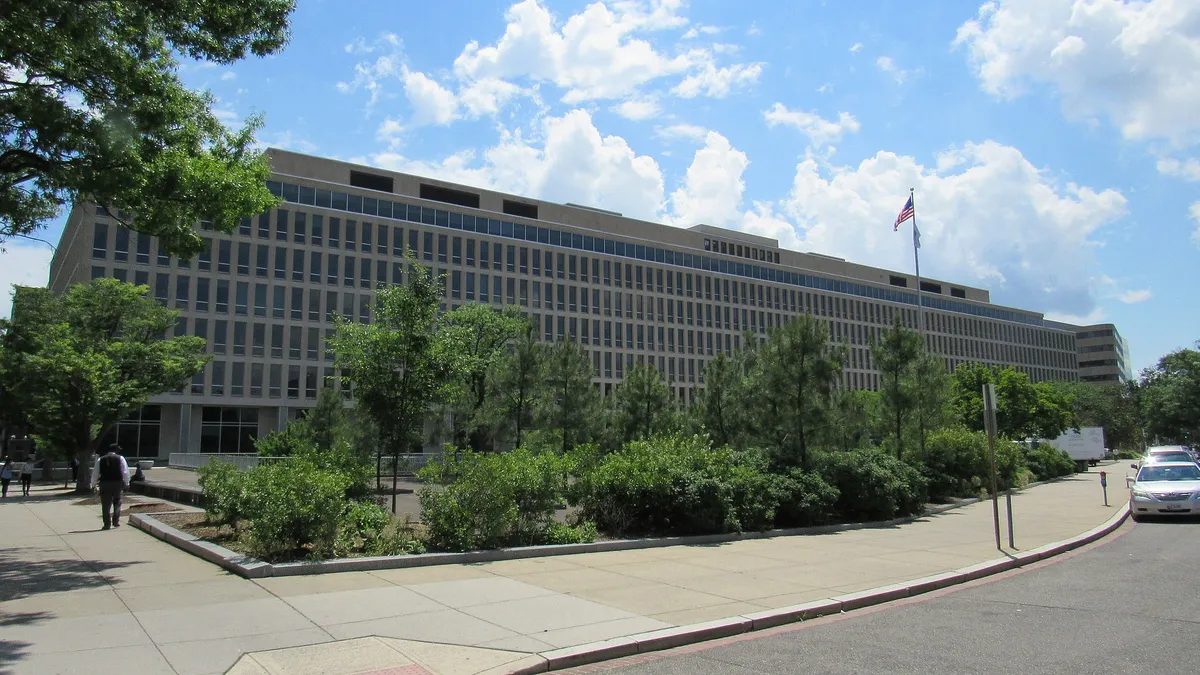Dive Brief:
- A unit within the U.S. Department of Education charged with making sure colleges aren't misrepresenting themselves to students has been dogged by frequent reorganizations, changing priorities, and staff and leadership turnover, according to a new congressional watchdog report.
- The unit had nine different directors in roughly six years, the Government Accountability Office wrote in a report released Thursday. At one point in 2017, the Education Department placed all of the unit's open investigations on hold and diverted its staff to other offices. That resulted in fewer new probes over the next several years.
- The Education Department penalized 13 colleges for substantial misrepresentations from 2016 to 2021. Ramifications can range from fines to ending colleges' participation in federal student aid.
Dive Insight:
Colleges are not allowed to substantially misrepresent their programs, costs or graduates' employment outcomes. Specific types of false and misleading statements count as substantial misrepresentations, but so do omissions.
Misrepresentations can result in big costs for students and the federal government. Students who rack up larger-than-expected bills and find few employment prospects upon leaving college can find it hard to pay off student loans. And the government can end up forgiving those loans if colleges are later found to have misled students.
In 2016, the Education Department created a Student Aid Enforcement Unit with an Investigations Group. The idea was to bolster oversight of colleges taking part in federal financial aid programs — including any misrepresentations they were making.
But organizational structures changed several times since then. Initially, the head of the enforcement arm reported directly to the head of Federal Student Aid, then the unit was moved down on the organizational chart in 2020, the GAO found. In September 2022, it was moved back up under the head of FSA.
Other decisions sapped the unit’s strength. In August 2017, managers told the group to place four open investigations on hold. Three of those investigations were looking at possible misrepresentations by colleges.
"Officials we spoke to were not able to explain the reason or provide documentation for the decision to place investigations on hold, but said their understanding was that management priorities had shifted away from conducting investigations," the GAO report said. "Based on this decision, officials said that the Investigations Group stopped almost all of its investigations work."
The Education Department also moved staff from the group to other areas. The department opened three substantial misrepresentation investigations in 2017. It proceeded to open just one from 2018 to 2020.
Since the beginning of 2021, the Education Department has opened six new investigations into colleges’ possible misrepresentations.
In the years when the group was conducting fewer investigations, a different part of the Education Department, Federal Student Aid regional offices, were the primary source of oversight, according to the GAO.
Education Department officials told the watchdog that oversight of colleges' misrepresentation will now be a priority. But when the GAO examined the situation, the department hadn't completed written procedures for choosing which colleges will be investigated or for conducting investigations. It also hadn't updated procedures for imposing penalties.
"Education has lacked these complete and updated procedures for at least 6 years — even after it was noted by an internal Education review — and has repeatedly missed its own deadlines to update them," the report says.
It recommends completing the written procedures. The Education Department agreed with those recommendations.
Federal Student Aid's Chief Operating Officer, Richard Cordray, blamed former President Donald Trump's administration for the state of enforcement.
"The Department is committed to strengthening our oversight work by rebuilding the Enforcement Office, led by a Chief Enforcement Officer," Cordray wrote in a response to the GAO. "This key office was first established in 2016 but was deprioritized in the prior administration."
Rep. Bobby Scott, a Virginia Democrat who is ranking member of the House Committee on Education and the Workforce, in a news release blamed the Trump administration for many of the troubles.
"When planning for college, students and parents should be able to trust that institutions are providing accurate information about their programs and their graduates’ success," said Scott, who requested the GAO report when he led the House education committee. "Unfortunately, as this report confirms, the previous administration chose to effectively ignore its responsibility to hold colleges accountable for misrepresenting themselves to students and the public."














